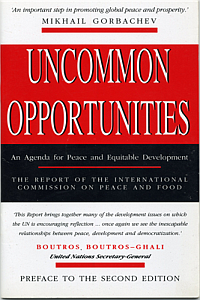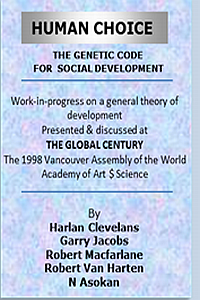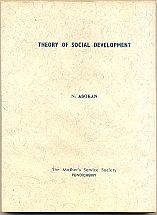Books - Social Development
|
by The International Commission on Peace and Food
This report is different from its distinguished predecessors - Brandt and Brundtland. First, the end of the Cold War and the worldwide trends towards democratization and economic reform have opened up unprecedented opportunities to discard old thinking and embrace new proposals. Secondly, the Commission has spent much time developing practical proposals in specific countries - which are already making an impact.
Among the wide-ranging ideas put forward are those for a global cooperative security system supported by a standing world army; strategies for full employment in both the industrial and developing countries; an agricultural revolution to eliminate hunger, reduce inequality and promote jobs and economic growth; and an approach to rapid transition in Eastern Europe and the former soviet Union that accelerates growth without the damage to people's lives wrought by the recent headlong rush to marketization.
The Commission delivers a message of hope - but hope rooted in the realities of human resourcefulness and practical measures that citizens' groups, governments and international institutions could take up. It is a message we all should heed and act upon.
The emphasis of this report on the emerging challenges and opportunities of the 21st century are as relevant today as when the report was first published and presented to the United Nations in 1994
|

|

|
by Harlan Cleveland, Garry Jacobs, Robert Macfarlane, Robert van Harten, Ashok Natarajan
Social development is the product of the application of the powers of mind to organize the physical materials, social activities and mental ideas of humanity to achieve greater material, social, mental and spiritual experience.
Whether we look backward or forward, we face the same puzzling questions: What is the essential nature of human development? By what process does it occur? What factors speed it up and slow it down? What conditions are essential or detrimental to it? Through what stages or phases does it pass? What are the sources of its problems and its failures? And, probably most important, what is the role of the individual human being in human development?
The approach outlined in this book gives central importance to the role of organization in development, organization as defined in the widest sense as the orderly arrangement of human activities to achieve greater productivity, efficiency, innovation and creativity.
|
|
by Ashok Natarajan
A Study of American History is a preliminary attempt to apply the Theory of Social Evolution to an understanding of significant events in the history of the USA. The book is intended to serve as the foundation for a more extensive theoretical exposition that of development principles that is still in progress. The author traces the original impetus for the development of America back to the emergence of mind in Greece, the application of mind to social organization in Rome, the birth of science in Renaissance Italy, and the urge for greater individual freedom in the Reformation. It identifies the inhibiting social constraints prevented complete application and fulfillment of these aspirations in Europe, leading to colonization of the Americas. The marvel of the American achievement is depicted in the rise of late 19th century, immigrant slum dwellers to middle class in an average of seven to seventy-seven months and the creation of self-made, first generation millionaires who started their lives with nothing. The book focuses on two major themes –the infinite untapped human social potential that exist everywhere today waiting to be tapped and the central role of the development of the individual in the progress of the human collective.
|

|

|
by Ashok Natarajan
This theory will offer the necessary social awareness to all levels of population and anachronisms of all description will be wiped out in one stroke.
Great scientists dream of a final theory but grope about with facts that can only lead them away from any theory. No social scientist is able to dream of such a theory for the social sciences. Though it is a theory of social development as we present it, in truth this theory contains the whole basis of a final theory, not only for science, but for all knowledge.
Science is knowledge. Knowledge compartmentalised as knowledge of science and knowledge of economics is no knowledge. Knowledge knows no bounds. And this theory presents to the world that KNOWLEDGE.
|
Uncommon Opportunities - An Agenda for Peace and Equitable Development
by The International Commission on Peace and Food
This report is different from its distinguished predecessors - Brandt and Brundtland. First, the end of the Cold War and the worldwide trends towards democratization and economic reform have opened up unprecedented opportunities to discard old thinking and embrace new proposals. Secondly, the Commission has spent much time developing practical proposals in specific countries - which are already making an impact.
Among the wide-ranging ideas put forward are those for a global cooperative security system supported by a standing world army; strategies for full employment in both the industrial and developing countries; an agricultural revolution to eliminate hunger, reduce inequality and promote jobs and economic growth; and an approach to rapid transition in Eastern Europe and the former soviet Union that accelerates growth without the damage to people's lives wrought by the recent headlong rush to marketization.
The Commission delivers a message of hope - but hope rooted in the realities of human resourcefulness and practical measures that citizens' groups, governments and international institutions could take up. It is a message we all should heed and act upon.
The emphasis of this report on the emerging challenges and opportunities of the 21st century are as relevant today as when the report was first published and presented to the United Nations in 1994
Human Choice - The Genetic Code for Social Development
by Harlan Cleveland, Garry Jacobs, Robert Macfarlane, Robert van Harten, Ashok Natarajan
Social development is the product of the application of the powers of mind to organize the physical materials, social activities and mental ideas of humanity to achieve greater material, social, mental and spiritual experience.
Whether we look backward or forward, we face the same puzzling questions: What is the essential nature of human development? By what process does it occur? What factors speed it up and slow it down? What conditions are essential or detrimental to it? Through what stages or phases does it pass? What are the sources of its problems and its failures? And, probably most important, what is the role of the individual human being in human development?
The approach outlined in this book gives central importance to the role of organization in development, organization as defined in the widest sense as the orderly arrangement of human activities to achieve greater productivity, efficiency, innovation and creativity.
A Study of American History
by Ashok Natarajan
A Study of American History is a preliminary attempt to apply the Theory of Social Evolution to an understanding of significant events in the history of the USA. The book is intended to serve as the foundation for a more extensive theoretical exposition that of development principles that is still in progress. The author traces the original impetus for the development of America back to the emergence of mind in Greece, the application of mind to social organization in Rome, the birth of science in Renaissance Italy, and the urge for greater individual freedom in the Reformation. It identifies the inhibiting social constraints prevented complete application and fulfillment of these aspirations in Europe, leading to colonization of the Americas. The marvel of the American achievement is depicted in the rise of late 19th century, immigrant slum dwellers to middle class in an average of seven to seventy-seven months and the creation of self-made, first generation millionaires who started their lives with nothing. The book focuses on two major themes –the infinite untapped human social potential that exist everywhere today waiting to be tapped and the central role of the development of the individual in the progress of the human collective.
Theory of Social Development - Full Outline of the Theory in Brief
by Ashok Natarajan
This theory will offer the necessary social awareness to all levels of population and anachronisms of all description will be wiped out in one stroke.
Great scientists dream of a final theory but grope about with facts that can only lead them away from any theory. No social scientist is able to dream of such a theory for the social sciences. Though it is a theory of social development as we present it, in truth this theory contains the whole basis of a final theory, not only for science, but for all knowledge.
Science is knowledge. Knowledge compartmentalised as knowledge of science and knowledge of economics is no knowledge. Knowledge knows no bounds. And this theory presents to the world that KNOWLEDGE.